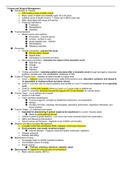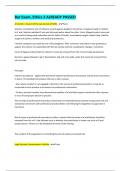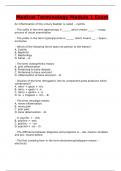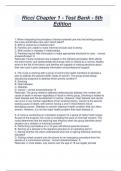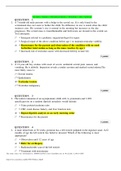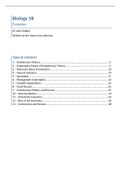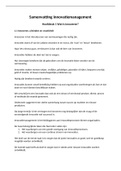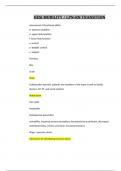1. intro
What is the European Union? ,What do we compare it to?,Is the EU a State? Is the EU an
international organization?
It is less than a state but less than an IO. It has its territory, citizens. But it has no monopoly
of the use of force.
IO: there are member states, policies.. but there is an extra ordem transfer of power from the
member states to the EU. 80% of the legislation comes from the EU. The EU law has
preference over national legislation. It can be better in some area to lobby Brussels than the
member states.
Sui-generis — “unidentified” political object. Old construct proposed by a former president of
the European Commission, Jacques Delors 1985. “In 30 or 40 years Europe will constitute a
UPO, unidentified political object, unless e weld it into an entity enabling each of our
countries to benefit from the European dimension and to prosper **”.
Why study the European Union?
1. The international environment is changing: the liberal order is contested. How is the
EU dealing with these challenges?
2. Is the EU willing an equipped for the war in Ukraine?
3. EU and the democratic backsliding
4. Rising of the Euroscepticism
5. EU and crisis like Covid. Transfer competences?
- Many people have strong opinions about the EU but… …few people have detailed
knowledge about the EU.
Three levels of politics:
Domestic — politics of the member states
EU — mainly in Brussels
International — EU in the UN, EU-Japan strategic partnership..
These boundaries are blurred.
2. History of European integration
2.1 Why should we study history?
- Important to our understanding of the EU because it provides the context (ex to an
in-depth analysis of Brexit or to understand the powers of different institutions).It
helps us to understand why Brexit happened, why some transfers of power did not
happen.
- Crucial in order to propose useful and realistic solutions to problems: many of them
are historically rooted and we don’t want to repeat the past mistakes.
- Some theories explicitly refer to history, ex historical institutionalism,
“path-dependence”.. Path dependence: the choices made in the past are difficult to
change in the present.
,2.2 Early ideas about European integration:
- Richard von Coudenhove-Kalergi, PanEuropa, 1923 suggested a union of peoples of
Europe.
- Aristide Briand, European Federation (common market, European Union).
- Edouard Herriot 1924 and Churchill 1946, a “United States of Europe”. He wanted
the UK to stay out of it. Not participating to the idea of shared sovereignty.
Challenges of Post-War Europe.
Rebuild destroyed economies: Marshall Plan, organization for European Economic
Cooperation (after 1960 reorganized in the Organization for Economic Cooperation, OECD).
Ensure security: foundation of NATO in 1946, brining Germany not a Western community
and allow rearmament only under supranational supervision (Schuman Plan).
Limit the danger of nationalism that caused the wars in Europe: European movement with
ambition of federation 1948, council of Europe 1949 with European Convention on Human
Rights. Council of Europe: a different international organization.
The Schuman Plan: Europe will not be made all at once, or according to a single plan. It will
be built through concrete achievements which first create a de facto solidarity. Origin:
French Mistrust of German strength in 1950
- Cooperation in the field of coal and steel production would ensure control over the
production of weapons of war and break up German industries.
- Schuman and Monnet proposed to place “Franco-German production of coal and
steel as a whole under a common High Authority”.
, - Creation of the European Coal and Steel Community - ECSC by the Treaty of Paris
in 1951, signed by Italy, Benelux, Germany and France. Schumann took the political
responsibility of this plan, this is why it has its name.
The ECSC —>
Integration optimism during the 50s.
- European defense community proposed in 1946 by German chancellor Adenauer,
rejected by French National Assembly in 1954.
, - Pleven Plan: common defence, European Army, European minister of defence.
Supranational elements - transfer of some powers to Brussels.
- Instead of creating an European Defence Community, the Uk PM proposed this:
West European Union created in 1954 as intergovernmental military cooperation at
the initiative of the UK (in the shadow of NATO, ended in 2011). The French accepted
it. One of the reasons was the presence one the UK. It was really in the shadow of
NATO.
- European Political Community proposed in 1953: executive council, council of
ministers, court of justice, parliament, but the idea died with the end of the EDC.
They wanted a permanent organization of a federal structure.
In the failure of this, the European countries tried to move on with economic integration.
Context: failed political and military integration and Monnet appointed the president of ECSC
authority.
The treaty of Rome 1957. Actually, there were two treaties:
- European atomic energy community (EURATOM)
- European economic Community (EEC).:Creation of a single market within 12 ears,
free movement of people, capital and services. Elimination of customs and
establishment of common external tariffs. Common politics on agriculture, trade,
transport and competition. European Social Fund, European investment Bank.
A direct foundation for the EU. A true skeleton of today’s EU.
Uncertainty and crisis 1958 - 1972.
Early days of the EEC.
Context: Soviet threat and Cuban missile crisis in 1962, escalation of the war in Vietnam.
Substantial increase in intra-EEC (50% between 1958 and 1960), only limited progress on
removing barriers on the free movement of workers.
What is the European Union? ,What do we compare it to?,Is the EU a State? Is the EU an
international organization?
It is less than a state but less than an IO. It has its territory, citizens. But it has no monopoly
of the use of force.
IO: there are member states, policies.. but there is an extra ordem transfer of power from the
member states to the EU. 80% of the legislation comes from the EU. The EU law has
preference over national legislation. It can be better in some area to lobby Brussels than the
member states.
Sui-generis — “unidentified” political object. Old construct proposed by a former president of
the European Commission, Jacques Delors 1985. “In 30 or 40 years Europe will constitute a
UPO, unidentified political object, unless e weld it into an entity enabling each of our
countries to benefit from the European dimension and to prosper **”.
Why study the European Union?
1. The international environment is changing: the liberal order is contested. How is the
EU dealing with these challenges?
2. Is the EU willing an equipped for the war in Ukraine?
3. EU and the democratic backsliding
4. Rising of the Euroscepticism
5. EU and crisis like Covid. Transfer competences?
- Many people have strong opinions about the EU but… …few people have detailed
knowledge about the EU.
Three levels of politics:
Domestic — politics of the member states
EU — mainly in Brussels
International — EU in the UN, EU-Japan strategic partnership..
These boundaries are blurred.
2. History of European integration
2.1 Why should we study history?
- Important to our understanding of the EU because it provides the context (ex to an
in-depth analysis of Brexit or to understand the powers of different institutions).It
helps us to understand why Brexit happened, why some transfers of power did not
happen.
- Crucial in order to propose useful and realistic solutions to problems: many of them
are historically rooted and we don’t want to repeat the past mistakes.
- Some theories explicitly refer to history, ex historical institutionalism,
“path-dependence”.. Path dependence: the choices made in the past are difficult to
change in the present.
,2.2 Early ideas about European integration:
- Richard von Coudenhove-Kalergi, PanEuropa, 1923 suggested a union of peoples of
Europe.
- Aristide Briand, European Federation (common market, European Union).
- Edouard Herriot 1924 and Churchill 1946, a “United States of Europe”. He wanted
the UK to stay out of it. Not participating to the idea of shared sovereignty.
Challenges of Post-War Europe.
Rebuild destroyed economies: Marshall Plan, organization for European Economic
Cooperation (after 1960 reorganized in the Organization for Economic Cooperation, OECD).
Ensure security: foundation of NATO in 1946, brining Germany not a Western community
and allow rearmament only under supranational supervision (Schuman Plan).
Limit the danger of nationalism that caused the wars in Europe: European movement with
ambition of federation 1948, council of Europe 1949 with European Convention on Human
Rights. Council of Europe: a different international organization.
The Schuman Plan: Europe will not be made all at once, or according to a single plan. It will
be built through concrete achievements which first create a de facto solidarity. Origin:
French Mistrust of German strength in 1950
- Cooperation in the field of coal and steel production would ensure control over the
production of weapons of war and break up German industries.
- Schuman and Monnet proposed to place “Franco-German production of coal and
steel as a whole under a common High Authority”.
, - Creation of the European Coal and Steel Community - ECSC by the Treaty of Paris
in 1951, signed by Italy, Benelux, Germany and France. Schumann took the political
responsibility of this plan, this is why it has its name.
The ECSC —>
Integration optimism during the 50s.
- European defense community proposed in 1946 by German chancellor Adenauer,
rejected by French National Assembly in 1954.
, - Pleven Plan: common defence, European Army, European minister of defence.
Supranational elements - transfer of some powers to Brussels.
- Instead of creating an European Defence Community, the Uk PM proposed this:
West European Union created in 1954 as intergovernmental military cooperation at
the initiative of the UK (in the shadow of NATO, ended in 2011). The French accepted
it. One of the reasons was the presence one the UK. It was really in the shadow of
NATO.
- European Political Community proposed in 1953: executive council, council of
ministers, court of justice, parliament, but the idea died with the end of the EDC.
They wanted a permanent organization of a federal structure.
In the failure of this, the European countries tried to move on with economic integration.
Context: failed political and military integration and Monnet appointed the president of ECSC
authority.
The treaty of Rome 1957. Actually, there were two treaties:
- European atomic energy community (EURATOM)
- European economic Community (EEC).:Creation of a single market within 12 ears,
free movement of people, capital and services. Elimination of customs and
establishment of common external tariffs. Common politics on agriculture, trade,
transport and competition. European Social Fund, European investment Bank.
A direct foundation for the EU. A true skeleton of today’s EU.
Uncertainty and crisis 1958 - 1972.
Early days of the EEC.
Context: Soviet threat and Cuban missile crisis in 1962, escalation of the war in Vietnam.
Substantial increase in intra-EEC (50% between 1958 and 1960), only limited progress on
removing barriers on the free movement of workers.


